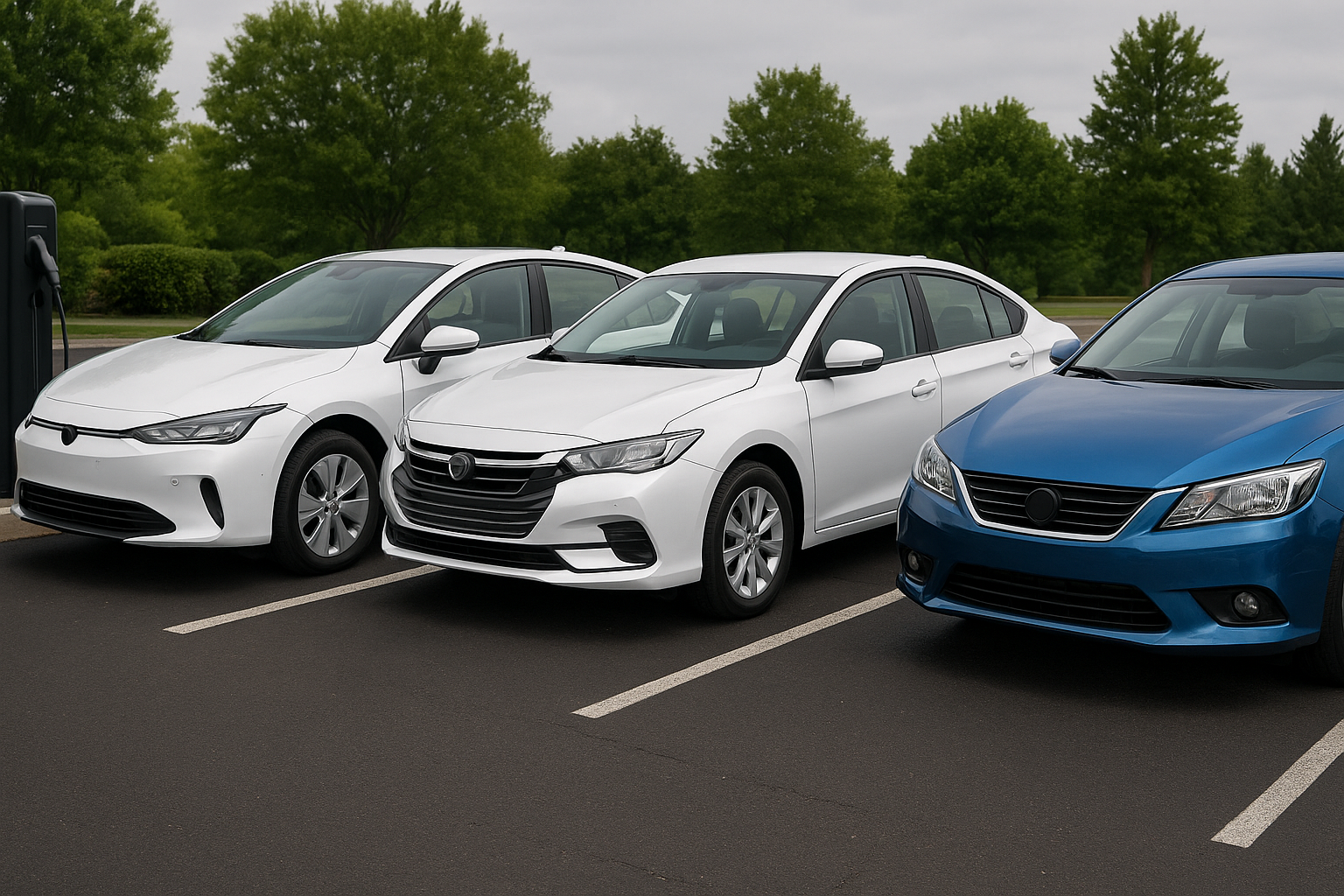Introduction
EV vs Hybrid vs Petrol: What Should You Buy in 2025? As we enter 2025, the automotive world is undergoing a significant transformation. Governments are pushing for greener alternatives, fuel prices continue to fluctuate, and consumers are faced with more choices than ever before. Among the most debated topics is the decision between Electric Vehicles (EVs), Hybrid Cars, and Petrol-powered vehicles.
Each comes with its own set of advantages and drawbacks. But which is the best choice for you in 2025? This blog breaks down the pros, cons, and future viability of each option to help you make an informed decision.
Table of Contents
Understanding the Options
1. Electric Vehicles (EVs)
EVs are powered solely by electricity stored in a battery. They produce zero tailpipe emissions, making them a clean alternative to traditional internal combustion engines.
2. Hybrid Vehicles
Hybrids combine a petrol engine with an electric motor, allowing better fuel efficiency and lower emissions. There are various types, including mild hybrids, full hybrids, and plug-in hybrids (PHEVs).
3. Petrol Vehicles
Petrol or gasoline cars run on internal combustion engines. They’ve dominated the market for over a century but are now facing increased scrutiny for their environmental impact.
Cost Comparison in 2025
Purchase Price
- EVs: Prices are dropping due to advancements in battery technology and government subsidies, but they still often cost more upfront than petrol or hybrid models.
- Hybrids: Generally cheaper than EVs but more expensive than standard petrol cars.
- Petrol Cars: Usually the cheapest upfront, especially in entry-level segments.
Running Costs
- EVs: Very low. Electricity is significantly cheaper than petrol, and there are fewer moving parts to maintain.
- Hybrids: Better than petrol cars in city driving, where the electric motor is more active.
- Petrol: High fuel prices and frequent maintenance (like oil changes) make them costlier to run.
Performance and Driving Experience
EVs
- Pros: Instant torque, smooth acceleration, quieter ride.
- Cons: Limited range (though improving), charging time, and performance drop in extreme weather.
Hybrids
- Pros: Smooth transitions between petrol and electric, improved fuel economy.
- Cons: More complex systems can mean higher long-term repair costs.
Petrol
- Pros: Long driving range, wide availability, and strong performance in high-speed or heavy-load scenarios.
- Cons: Noisy, less fuel-efficient, and polluting.
Environmental Impact
EVs
- Produce zero emissions while driving. When powered by clean electricity, their carbon footprint is much lower. Battery production does have environmental costs, but lifecycle emissions are far lower than petrol cars.
Hybrids
- Lower emissions than petrol cars but still rely on fossil fuels, especially in highway driving.
Petrol
- Highest emissions and the least sustainable in the long term.
Charging and Refueling Infrastructure
EVs
- Charging networks are expanding quickly. In 2025, most urban areas have access to fast-charging stations, but long-distance travel may still pose challenges in some regions.
Hybrids
- Don’t require charging (unless plug-in), making them more flexible while still offering electric drive benefits.
Petrol
- Most convenient with well-established refueling infrastructure everywhere.
Maintenance and Reliability
EVs
- Fewer moving parts mean lower maintenance. No oil changes, fewer brake issues (due to regenerative braking), and fewer transmission problems.
Hybrids
- Require both petrol and electric system servicing. Battery replacement can be costly.
Petrol
- Widely available servicing, but more regular maintenance needed. Over time, they tend to have more wear and tear.
Resale Value and Longevity
EVs
- Early EVs had poor resale value, but this is improving in 2025 as demand increases. Brands like Tesla, Hyundai, and BYD are showing strong used EV markets.
Hybrids
- Hold value well, especially reliable models from Toyota and Honda.
Petrol
- Still widely traded, but future bans on petrol engines in many regions (e.g., Europe by 2035) could hurt long-term resale value.
Government Incentives
Many governments offer tax breaks, rebates, and perks (like free tolls or access to carpool lanes) for EVs and plug-in hybrids. Petrol vehicles are beginning to face higher taxes and emission penalties.
Use Case Scenarios: Which Car Is Right for You?
City Commuter
Best Choice: EV or Hybrid
- Short trips and easy access to charging make EVs ideal.
- If you’re concerned about range or charging, hybrids offer a good middle ground.
Long-Distance Traveller
Best Choice: Hybrid or Petrol
- Long highway drives may still be more convenient with petrol or hybrid vehicles due to quicker refueling.
Environmentally Conscious Driver
Best Choice: EV
- If reducing your carbon footprint is a priority, EVs are the clear winner.
Budget-Conscious Buyer
Best Choice: Hybrid or Petrol
- If upfront costs are a concern, hybrids offer a balance of affordability and efficiency. Petrol cars remain cheaper initially but cost more over time.
Future Outlook: 2025 and Beyond
The automotive industry is clearly shifting toward electrification. By 2025:
- EVs are expected to reach parity in cost with petrol cars.
- Charging infrastructure is improving dramatically.
- Governments continue to push for low- or zero-emission vehicles.
Automakers are also investing heavily in electric technology, with brands like Ford, Mercedes, and Volkswagen planning to go all-electric within the next decade.
Still, hybrids and petrol vehicles will remain relevant, especially in developing regions or for specific use cases where EVs are not yet practical.
Conclusion
Choosing between an EV, hybrid, or petrol vehicle in 2025 depends largely on your lifestyle, budget, and environmental values. While EVs are clearly the future, they may not yet be suitable for everyone. Hybrids offer a smart compromise, while petrol vehicles are gradually losing favor but still serve certain needs well.
To make the best choice:
- Evaluate your driving habits
- Consider local fuel and electricity costs
- Check government incentives in your region
- Think long-term—not just about today’s price tag
As technology evolves, the gap between these options is shrinking. But in many ways, 2025 may be your last best chance to choose your side before EVs become the default.
You can find more Automobile content:
https://allinsightlab.com/category/automobiles/

